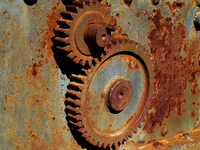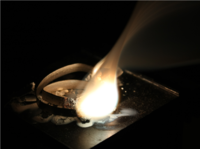Contents
Key Stage 4
Meaning
Rate of reaction is a measure of how quickly the reactants react to create the products.
About the Rate of Reaction
- The longer the time taken for a reaction the lower the rate of reaction. The shorter the time taken for a reaction the higher the rate of reaction.
- High rates of reaction are important to in industries where a lot of products are needed in a short amount of time. This can save money.
- Low rates of reaction are important in materials that corrode with chemicals in the environment. This allows them to last a long time before destroyed by Oxidation or chemical weathering.
Examples
| Rusting has a low rate of reaction. | Burning Magnesium ribbon has a high rate of reaction. |
Determining the Rate of Reaction
There are two approaches to finding the rate of reaction for some chemicals.
Continuously Measuring Volume of Gas
Continuously Measuring the Mass
For reactions which give off a gas

